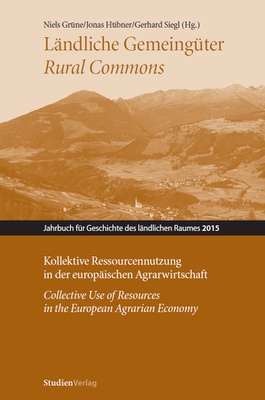Collective Use of Resources in the European Agrarian Economy (RHY 12/2015)
Edited by Niels Grüne, Jonas Hübner and Gerhard Siegl
Rural commons are institutions organised around the collective use of natural resources. Since the agrarian reforms of the eighteenth and nineteenth centuries, these institutions have changed in a variety of ways: from their dissolution in some places to their integration into (post-) industrial economic and constitutional structures in others. The German and English articles in this volume provide case studies and present summaries of current research on rural commons. The contributions focus on European regions in comparative perspective and cover the period from the late Middle Ages to the twenty-first century.
Vorwort/Preface
Niels Grüne/Jonas Hübner/Gerhard Siegl: Rural commons. Aims and key issues of the volume
Forschungspfade und Neuorientierungen/Research trajectories and new orientations
José-Miguel Lana: From privatisation to governed nature.Old and new approaches to rural commons in Spain
Jonathan Healey: Co-operation and conflict. Politics, institutions and the management of the English commons, 1500–1700
Sylvain Olivier: Rural commons in Mediterranean France from the seventeenth to the twentieth centuries
Stefan Brakensiek: Traditionen und neuere Tendenzen der deutschen Forschung zur Geschichte ländlicher Gemeingüter. Ein Überblick
Piotr Guzowski: The commons in late medieval and early modern Poland. An unattended historical phenomenon
Eduard Maur: Ländliche Gemeingüter in Böhmen vom 16. bis zum 19. Jahrhundert. Eine Bestandsaufnahme und einige Neuansätze der Forschung
Antal Szántay: Rural commons in eighteenth-century Hungary
Lokale und regionale Fallstudien/Local and regional case studies
José A. Serrano Álvarez: Commons and poor relief in pre-industrial societies. A case study on northwest Spain (León), 1850–1950
Anne Marie Granet-Abisset: Natural territories, cultural territories. Tensions and conflicting challenges surrounding French high Alpine real estate since the nineteenth century
Evi Pechlaner: Agrargemeinschaften und Gemeingüter in Südtirol. Beobachtungen zum Spannungsfeld österreichischer und italienischer Rechtsordnungen
Luca Mocarelli: Managing common land in unequal societies. The case of the Lombard Alps in the eighteenth century
Jonas Hübner: Soziale Ungleichheit in einem ländlichen Ressourcenregime der Frühen Neuzeit. Die Essener Mark bei Osnabrück
Teresa Massinger: Allmende- und Herrschaftskonflikte im fränkisch-schwäbischen territorium inclausum. Der Streit um die Landeshoheit im Raum um Dinkelsbühl am Beispiel der Markungsgemeinde Aufkirchen-Gerolfingen
Problemspezifische Analysen und Vergleiche/Problem-specific analyses and comparisons
Tine De Moor/Annelies Tukker: Survival without sanctioning. The relationship between institutional resilience and methods of dealing with free-riding on early modern Dutch commons
Jesper Larsson: Crises, commons and collective action. The changing use of woodlands and mountains in seventeenth-century upland Scandinavia
Christoph Pöll: Transformationsprozesse in der alpinen Milchwirtschaft des späten 19. Jahrhunderts. Die Einführung der Hartkäseerzeugung auf den Gemeinschaftsalmen des Nordtiroler Unterlandes
Anne-Lise Head-König: Common land and collective property in pre-Alpine and Alpine Switzerland. Tensions regarding access to resources and their allocation (Middle Ages–twentieth century)
Niels Grüne/Gerhard Siegl: Kontrastierende Persistenz ländlicher Gemeingüter in Tirol und der badischen Pfalz (18.–21. Jahrhundert)
Hein van Gils/Rohan Mark Bennett/Martin Hipondoka: Of pastures and tourism. A comparison of Tyrolean and Namibian commons institutions
Resümee/Conclusion
Niels Grüne/Jonas Hübner/Gerhard Siegl: Institutionen und Praktiken kollektiver Ressourcennutzung in der europäischen Agrarwirtschaft. Vergleichende Betrachtungen und Forschungsperspektiven
Nachruf Markus Cerman (1967–2015)
Order a copy at StudienVerlag (ISBN: 978-3-7065-5402-2)
